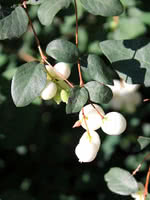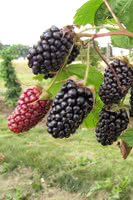Mon-Fri 9am - 5pm Mountain time
Western Snowberry vs Chester Thornless Blackberry
Symphoricarpos occidentalis
Rubus fruticosa Chester (Thornless)
NOT AVAILABLE THIS SEASON - MIGHT RETURN
NOT AVAILABLE THIS SEASON - MIGHT RETURN
(new stock expected: fall of 2026)
Like the Common Snowberry, the Western Snowberry is a small shrub with pink flowers useful for feeding livestock and preventing erosion. Unlike the common species, however, the Western Snowberry is much more suited to wet conditions, capable of persevering through poor soil drainage and occasional flooding.
After the Snowberry's flowers have bloomed, it produces berries which often last on the plant through winter. These berries are toxic to humans, but livestock and local wildlife love them! Those hoping to attract wildlife to their property can plant Snowberry and expect to see animals foraging on it much later in the year than other plants.
Chester Thornless Blackberry is a self-pollinating fruit-bearing shrub. In mid-summer, the Chester Thornless Blackberry produces large, sweet-tasting, heart-shaped blackberries that are perfect for fresh eating. It is a semi-erect blackberry plant that requires little support from a trellis to keep its fruit off the ground. Don't forget to protect your berries. The birds love this shrub almost as much as you will.
Chester Thornless Blackberries are floricanes, primarily fruiting on second year canes. Each spring cut back all two-year old canes, leaving only the last year’s growth.
Western Snowberry Quick Facts
Chester Thornless Blackberry Quick Facts
Toxicity: berries are toxic to humans

